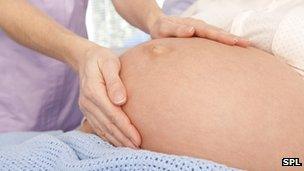Booming birth rate 'a strain on NHS midwifery services'
- Published

Older mums may need more intervention
England is seeing a massive increase in its birth rate which is putting a strain on the NHS, midwives warn.
In 2011 there were 688,120 babies born in England, the highest number since 1971, official figures show.
Provisional numbers from the Office for National Statistics suggest 2012 could be another record-breaking year.
The Royal College of Midwives (RCM) says hospital services are struggling to keep up. But the government says it has been investing in maternity care.
Health Minister Dr Dan Poulter said that the number of midwives is increasing faster than the birth rate.
Jon Skewes, a director at the RCM, says some maternity units have been forced to close temporarily for safety reasons because demand has outstripped staffing.
Birthing hotspots
The RCM says a big issue is the country's rising birth rate - which is up by more than 124,000 since 2001.
In some parts of England, the birth rate has jumped more than 50% in recent years.
The area which saw the fastest growing number of births to local women was Corby, Northamptonshire, where births jumped 63% between 2002 and 2011. That was almost three times faster than the England-wide rise of about 21%.
Other "hotspots" include Bournemouth, Boston in Lincolnshire , the London borough of Barking and Dagenham, Slough and Norwich (48%), Peterborough, Watford, Southampton, and Bristol, says the RCM's report called The State of Maternity Services.
In Scotland, Wales and Northern Ireland the birth rate has plateaued.
Throughout the UK more older mothers are now giving birth - the number of babies born to women aged 30-34 was the highest on record, with records beginning in 1938.
Meanwhile, the number of babies born to girls and women aged below 20 has fallen.
Ageing nation
Older mothers are more likely to experience complications during pregnancy and labour and need medical intervention.
Official data, external also suggest that immigration may be another factor behind rising birth rates - foreign-born mothers make up nearly a quarter of the figures.
The RCM says although more midwives are being employed in England, and the number of places for midwives in training is on the rise, there are still too few staff to cope with the rising demand for services.
And with a substantial number of England's working midwives soon reaching retirement age, the problem could intensify, it says.
RCM chief executive Cathy Warwick said: "England remains around 5,000 midwives short of the number required to provide mothers and babies with high-quality service they need and deserve.
"Maternity units are under intense strain and have been now for many years, with many midwives really at the end of their tether in terms of what they can tolerate. We are reaching a crucial tipping point for maternity services in England."
Health Minister Dr Dan Poulter said: "It is because of the historical shortage in the number of midwives, that from day one, investing in maternity care has been a top priority for the government.
"We have taken quick action and there are now over 800 more midwives in the NHS since 2010, and there are also a record 5,000 midwives in training who will qualify in the next three years.
"The number of midwives is increasing faster than the birth rate. Most women already have choice and one-to-one maternity care, and we are working closely with the Royal College of Midwives to ensure that personalised, one to one maternity care is available for every woman across the country."
- Published13 January 2013
- Published19 December 2012
- Published27 November 2012
- Published3 July 2012